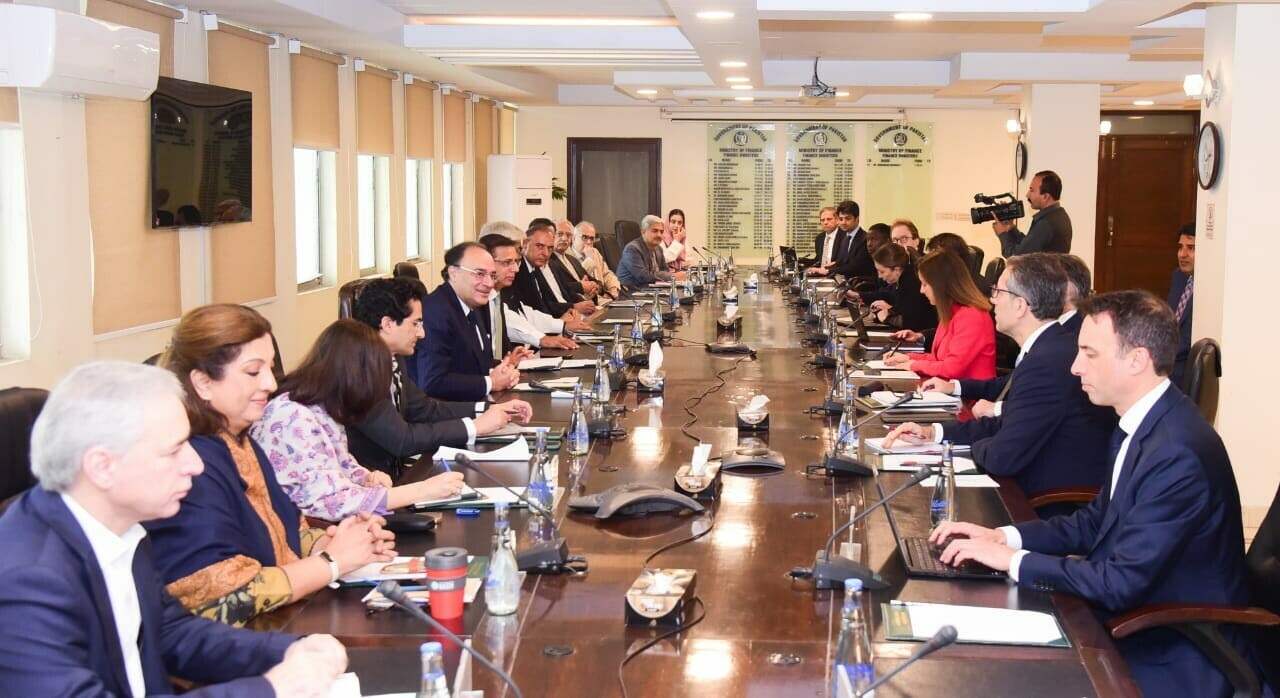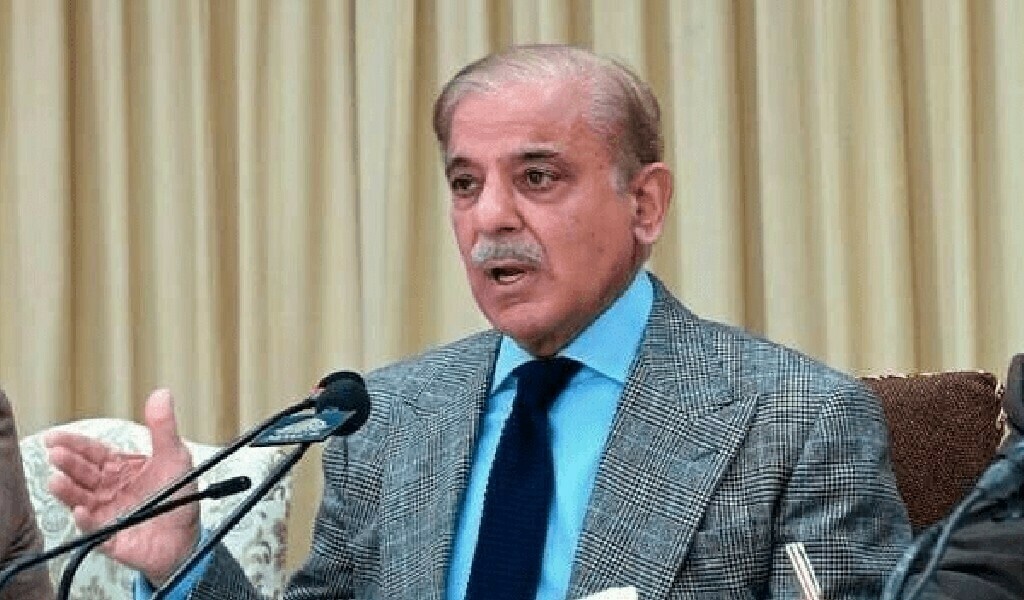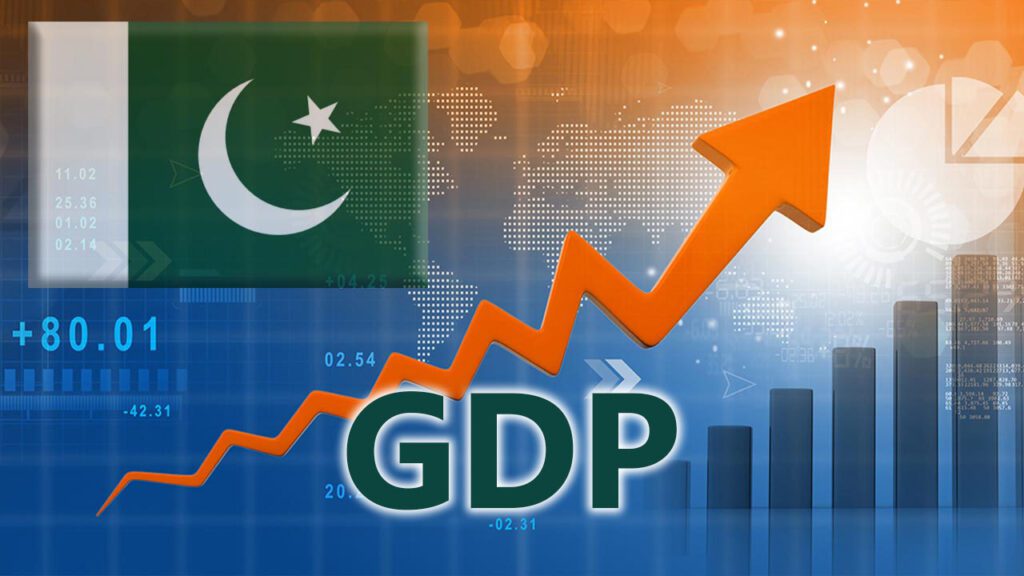PTBP Web Desk
The International Monetary Fund (IMF) delegation, headed by IMF Mission Chief Nathan Porter, held an important meeting with Pakistan’s Finance Minister Muhammad Aurangzeb on Tuesday.
The delegation’s visit is part of their staff mission to assess Pakistan’s economic progress and performance under the Extended Fund Facility (EFF). The meeting marks an essential step toward fostering dialogue between Pakistan and the IMF, especially concerning fiscal policies and economic reforms.
The delegation arrived in Pakistan on Monday for a visit aimed at evaluating recent developments and progress on Pakistan’s EFF program. This mission does not form part of the first review under the $7 billion EFF, which is expected to take place no earlier than the first quarter of 2025. The EFF was approved by the IMF in 2023 to support Pakistan’s economic stabilization and recovery efforts.
The meeting, held at the Finance Ministry, was attended by several key Pakistani officials, including Minister of State for Finance Ali Pervaiz Malik, Governor of the State Bank of Pakistan (SBP) Jameel Ahmad, Chairman of the Federal Board of Revenue (FBR) Rashid Mehmood Langrial, and other senior officials from the Ministry of Finance. While the meeting’s details have not been fully disclosed, it is understood that the primary topics of discussion included Pakistan’s ongoing efforts to meet fiscal targets and the IMF’s assessment of Pakistan’s economic conditions.
The Finance Division issued a brief statement following the meeting, noting the IMF delegation’s visit as part of an overall dialogue on the performance of Pakistan’s economic reforms. The focus, according to the Finance Ministry’s release, was on evaluating the progress made under the EFF program and addressing areas where Pakistan might need to adjust policies to stay on track.
One of the main points discussed during the meeting was Pakistan’s revenue collection targets. On Monday, the FBR provided the IMF delegation with a detailed briefing on the country’s revenue performance for the fiscal year 2024-25. The meeting highlighted the ongoing challenges in meeting the revenue collection targets, particularly for the second quarter (October-December) of the current fiscal year. The FBR’s performance has been under intense scrutiny, as there are concerns that the expected revenue shortfall could reach Rs230 billion during this period.
The FBR’s briefing also highlighted initiatives like the Tajir Dost Scheme, which aims to promote digital payments and increase the tax base by formalizing small and medium-sized enterprises (SMEs). Despite these efforts, the FBR has struggled to meet its targets. For instance, the FBR collected Rs877 billion in October 2024, which fell short of the assigned target of Rs980 billion. This represents a shortfall of Rs103 billion in the month of October alone.
Over the first four months of the fiscal year (July-October 2024), the FBR has collected Rs3,440 billion, but this also fell short of the target of Rs3,636 billion for the period. This shortfall of Rs196 billion has raised concerns about the ability of the FBR to meet its full-year revenue target. In light of these challenges, the FBR Chairman, Rashid Mehmood Langrial, discussed both short-term and long-term measures that could help reduce the projected shortfall. These include enhanced tax compliance, reforms in the tax system, and greater use of digital platforms to track and collect taxes.
The Finance Ministry and the IMF delegation discussed strategies to improve revenue collection in the face of these setbacks, with a focus on achieving fiscal balance and reducing Pakistan’s budgetary deficits. The government of Pakistan has been under pressure to meet fiscal targets to qualify for continued financial assistance from the IMF and other international donors. With Pakistan’s external debt obligations growing and the economy facing a challenging external environment, meeting these targets remains a key priority for the government.
The IMF delegation’s visit is a part of the broader process of monitoring Pakistan’s economic reform efforts under the EFF. Pakistan has implemented a series of fiscal and structural reforms as part of the agreement with the IMF, aimed at stabilizing the economy, enhancing fiscal discipline, and improving the balance of payments position. However, these reforms have often faced criticism from different segments of society, especially in light of their impact on inflation, unemployment, and social services.
In response, the IMF has urged Pakistan to accelerate the implementation of these reforms to ensure long-term sustainability. The IMF’s technical assistance and policy advice play a crucial role in guiding Pakistan through this challenging period. The IMF has been a key partner in helping Pakistan navigate economic instability, and the successful completion of the EFF program could pave the way for future financial support.
Looking ahead, Pakistan faces significant challenges in meeting its fiscal targets, reducing inflation, and ensuring financial stability. The IMF delegation’s visit underscores the importance of continued dialogue between Pakistan and the IMF to ensure that the country’s economic trajectory remains on track. While the IMF’s support remains crucial, it is clear that Pakistan’s long-term economic stability depends on implementing comprehensive reforms across various sectors, including taxation, energy, and governance.
For Pakistan, the upcoming review of the EFF in 2025 will be a critical juncture. The success or failure of this review could have far-reaching implications for Pakistan’s access to external financing and its ability to address its debt-related challenges. Consequently, the government’s ability to manage fiscal policy effectively, reduce the revenue shortfall, and meet IMF targets will be closely scrutinized by both domestic and international stakeholders.




